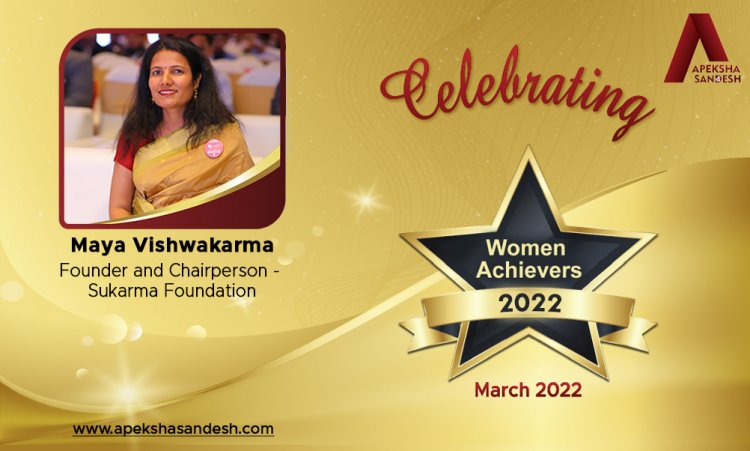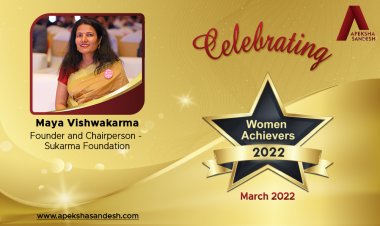There are lots of myth about menstrual hygiene at the local and tribal level that still exist - Maya Vishwakarma, Founder and Chairperson of Sukarma Foundation

Maya Vishwakarma is known as the ‘Pad Women of India’ for her unstinting pursuit towards eradicating the menstrual taboos in India.
She is the founder and chairperson of Sukarma Foundation that aims to educate and protect tribal and rural women about female hygiene and provide rural women with low-cost sustainable sanitary products. Maya, who has been living in San Francisco, California, USA, for nearly a decade, hails from Mehragaon, Narsinghpur, Madhya Pradesh where she has set up a mini factory that employs local women to manufacture low-cost sanitary napkins for tribal and rural girls after being inspired by the PADMAN Arunachalam Muruganantham who invented a low-cost sanitary pad manufacturing machine and started raising awareness about menstrual hygiene in rural India. Her various initiatives in eliminating deep-rooted existence of menstruation taboos existing in the society, empowering women, and helping them stand on their feet has earned her glorious accolades across the globe.
After completing high school in her village, Maya moved to Jabalpur RDVV University and studied bachelor’s and master’s degree in Biochemistry. During her master’s at the All India Institute of Medical Sciences (AIIMS) in New Delhi, Maya worked on thesis dissertation that focused on Nuclear Medicine. Later, she pursued Junior Research Fellowship (JRF) and moved to the United States to pursue her PhD program in Chemical and Biological Engineering from SDSMT (South Dakota School of Mines and Technology). Maya dropped out from her PhD and moved to the San Francisco Bay Area to pursue her career in Cancer Biology at the UCSF hospital.
Maya has made a documentary and even authored a book titled ‘Swaraj Mumkin Hai’ (Independence is Possible) advocating for sustainable villages.
Apeksha Sandesh had an opportunity to interact with the remarkably inspiring woman of excellence, Maya Vishwakarma and talk about her journey so far. Here are the excerpts!
You studied bachelor’s and master’s degree in Biochemistry and then master’s thesis dissertation work at the AIIMS that focused on Nuclear Medicine. Later, PhD program in Chemical and Biological Engineering and then pursued career in Cancer Biology at UCSF hospital. It is such an impressive educational journey. Please tell us more about it.
The journey was fascinating from my village to California, where I had ONLY 8th-grade school and mostly girls would dropout after 8th and get married. My case was different, and I feel I am extremely fortunate to have my mother who never went to school and father who only studied till 5th grade, moving to a different village for two more class (9th and 10th) and then another town for High school.
My dad being a blacksmith-carpenter, always encouraged me to move forward and become self-independent. I pursued my college in Jabalpur, where I was always short of money. I used to take tuition classes for children. It gave me hope that money cannot be an obstacle in studies. Later, I moved to AIIMS New Delhi for my master’s dissertation thesis work that gave me hope and confidence to become a Scientist. Later, I earned JRF (Junior Research Fellowship) from Indian Council Medical Research (ICMR), New Delhi.
I attended and presented various scientific conferences all over India and even travelled to Pittsburg (United State) in 2007 to present my research work. This motivated me to pursue my PhD program in United State. But later I dropped out of the PhD program and moved to San Francisco where I joined the University of California as a Senior Research Associate in cancer research.
Tell us something about why and how you laid the foundation of ‘Sukarma Foundation’. How has been your journey so far with Sukarma Foundation?
As mentioned, I was born and brought up in a remote village where we did not have basic facilities such as water, road, or electricity. I used to work in a farm as labor with my mother. We used to pick wood and cow dung for the cooking and water from the dudhi river. Growing in such a humble background I always, cherish those memories which made me what I am today.
Living in Bay Area with such an ultra-luxury lifestyle made me humbler to do something for society. I visit my village every year since I moved to the United States, so that I can see some issues at the ground level which we can fix/help from here. One of the prime issues was menstrual hygiene faced by girls and women. When I visited my village, I did not get sanitary pad in the nearby shops. Also, people don't talk about it because it is taboo there. I realized the need to do something about this issue because I also faced the same issues while growing up in the village during my teenage. Hence, in 2016 we started ‘Sukarma Foundation’ that aims to spread sanitary napkin and menstrual hygiene awareness. Under this project our objective is to protect tribal and rural girls and women from infections such as RTIs (Reproductive Tract Infections), UTIs (Urinary Tract Infections) and Cervical Cancer by educating them about menstrual hygiene and providing them with hygienic and low-cost sustainable sanitary pads.
What kind of activities takes place under Sukarma Foundation?
So far, we have mainly three initiatives that we have been working on - manufacturing ‘No Tension’ sanitary pad, ‘Telemedicine Primary Care Center’ in our village, ‘Sukarma Skill Center Sainkheda’ where we teach free computer and stitching to all the women and girls. We are planning to build a school soon too!
Menstrual taboo in India is still a huge issue. How do you think we can eradicate it?
We all must come together to eradicate this taboo. Government initiatives on policy level can work wonders. Also, I strongly suggest having menstrual hygiene as a part of the curriculum from 6th grade onwards in the schools.
How can we encourage more women towards menstrual hygiene?
By educating them and making them aware of the health issues faced due to unhygienic practices.
How is your sanitary napkins brand ‘No Tension’ different from other existing in the market? What is its USP?
Our pads are affordable. We don't do any marketing for them and save that money to subsidize pads at the local level. Our pads cost is 50% less than the market price which is an USP. It is 25 INR for 7 pads.
Please share some myths and their related facts about menstrual hygiene in India.
There are lots of myth about menstrual hygiene at the local and tribal level that still exist. There are families who still allow women to enter the kitchen, abstain from pooja and temple or any other function while they are in their cycles.
Does menstrual taboo exist outside India? How are they coping up with it?
Yes, it does. Some Indians who have moved to other countries follow the same rituals that have been followed by their families since ages.
Describe the scenario of access to reproductive health and the barriers surrounding the same in marginalized communities worldwide. How can we solve the issue in India and at the global level?
At the village and tribal level, reproductive health is very poor, Women in India see the worst facilities, mostly lack gynecologists, doctors, and primary level care. Preventive health is negligible in remote areas of India. I am sure about the other countries, but I have heard that Africa, Kenya, Pakistan, and Bangladesh also face similar issues.
Tell us something about your upcoming initiatives under the framework of your NGO.
We have adopted a government school in our village, which we are building into a model school for the nearby villages. From 1st grade to 12th grade, classes will be held, and it will have various kind of facilities, for which we are seeking CSR support.
What is the biggest challenge you have faced in your career so far, due to being a woman?
I have faced many challenges including concern for my safety, during travel. Needless to say, you meet gender bias people everywhere.
What main change would you like to see for young girls in the next generation?
They must get good education, empowerment, and health care.
Are there any assumptions about women that you would like to change? Why?
I want to change this perception that ‘a woman is the synonym week’. I think we need to take them as a human and not bifurcate between a man and a woman and give them equal opportunities.
Do you think Women’s Day should be celebrated? Why?
Yes, it should be celebrated because women who are working at the grassroots level must get be recognized and honored. It acts as an encouragement to continue working for the causes and communities they have been involved with.
Apeksha Sandesh congratulates 'Pad Woman of India' Maya Vishwakarma for her contribution and commitment towards society with her initiatives in eradicating menstrual taboo and empowering women. We wish her good luck for all her future endeavours!















































